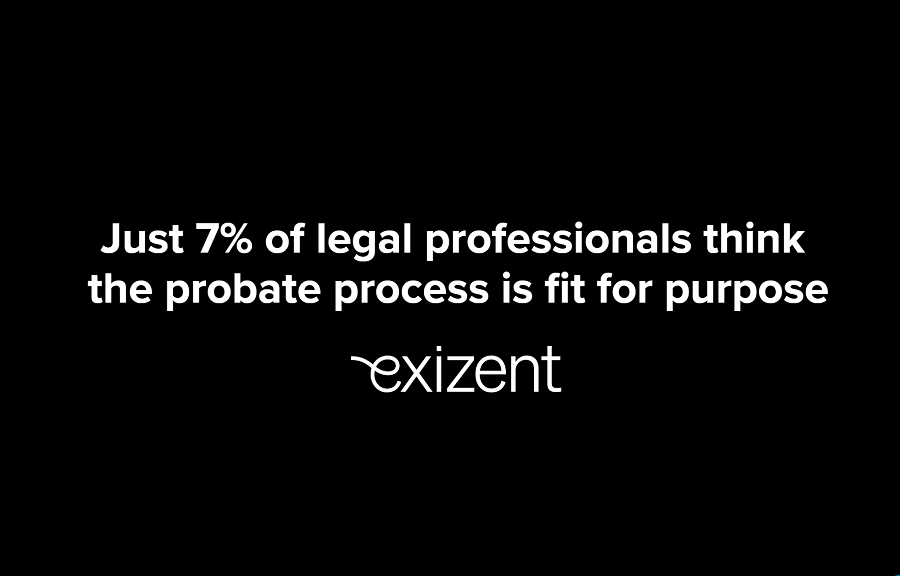- Just one in three legal firms think the time it takes to prepare probate is ‘reasonable’
- Most discovery work is still manual and paper-based
- Waiting for institutions to respond and administration takes up the most time
- 73% of firms say lockdown has further exacerbated the problem
Just seven per cent of legal firms think the probate process is efficient, according to the latest research from Exizent, the first-ever platform that connects data, services and the network of people involved when someone dies. Exizent’s survey, conducted alongside Today’s Wills & Probate, revealed that even though most law firms (64%) either have specialist probate teams or people who mainly work on probate cases, the vast majority feel the processes are inefficient and could be enhanced by technology.
The top reason respondents gave for why they think probate cases take so long was ‘waiting for institutions to get back to them’, with more than half (56%) saying this was the main hold up. More than half of respondents also said they had to wait up to eight weeks for a response – a third of those had to wait more than eight weeks.

After ‘waiting on institutions’, respondents said ‘administration’ was the next most time-consuming part of the probate process, with more than a quarter (27%) saying this causes the most delays.
Exizent’s research also revealed that Covid-19 has exacerbated the problem even further. Almost three quarters of those surveyed said the lockdown has impacted their executory work, citing financial institutions taking even longer to respond as a result of working from home.
The fact administration is such a time-consuming part of the process for many is perhaps not surprising when you consider that two thirds (66%) of respondents admit that manual/paper-based searches account for more than 50% of information gathering on assets and liabilities held by the deceased. In more than 80% of probate cases at least 10 printed letters are sent, in a third of cases it is up to 50 and in one in ten cases, more than 50 printed letters are sent.
The number of probate cases handled by legal services firms annually is 166,127 which, based on Exizent’s data, suggests that probate is responsible for at least 2.8 million letters every year, but it could be as many as 5.4million.
As a result of the inefficiencies surrounding probate cases, half of respondents think that the time it takes professionals to prepare and receive grant of probate on behalf of clients is unreasonable, while one in seven say they ‘don’t know’. Just over a third think the time it takes is reasonable.
Nick Cousins, founder and CEO of Exizent said:
“Our research shows that a significant majority of professionals think the time it takes to process probate cases is unreasonable, and that administration and waiting on institutions is taking up most of their time, yet most (85%) don’t have any technology dedicated to managing probate while 18% don’t use any software at all.
“People’s lives are increasingly dispersed and varied. Performing executry work with a growing number of banks and institutions is more complex than ever. Without standardisation and the right tools available, too much time is wasted on administration. What this means for families is frustration, long delays and unnecessary anguish in trying to piece together what’s required to administer an estate and release assets to beneficiaries.
“However, with the right technology in place, we know this profession could cut down the time and cost involved with managing probate cases exponentially and make the bereavement experience better for everyone involved.”
The Exizent online platform is specially designed for executry teams managing probate. Exizent is working with banks, share registrars, and other institutions to build standardised requests and responses, making it easier for legal services firms and institutions to work together to sort out what is needed and making the process more efficient and easing the burden on executors and families.
Cousins’ and co-founder Aleks Tomczyk’s own experiences led them to establish Exizent. They felt that the administrative tasks facing families after the death of a loved one should be far easier.
They have spent the last 18 months carefully designing, developing, and testing the product with innovative partners, and, in September, successfully raised £3.6 million in funding from several investors including FNZ. It launched fully to legal professionals this month.
You can view the report in full here: https://www.exizent.com/report



















